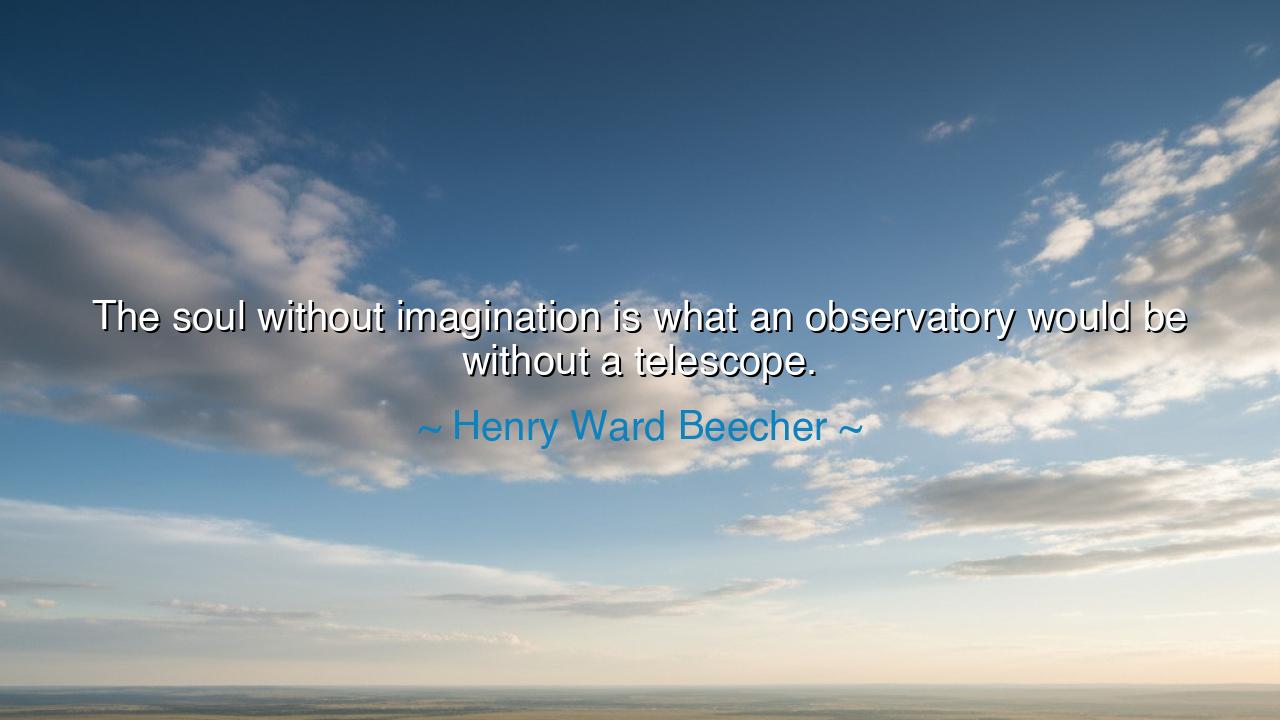
The soul without imagination is what an observatory would be






“The soul without imagination is what an observatory would be without a telescope.” Thus spoke Henry Ward Beecher, a preacher, reformer, and philosopher of the 19th century whose words burned with both moral fire and poetic insight. In this saying, he reveals a truth as vast as the heavens themselves — that imagination is not a luxury of the mind, but the very instrument through which the soul perceives the infinite. Without it, the inner eye is blind, the heart cannot see beyond the horizon of the visible, and the human spirit remains earthbound, unable to explore the mystery that lies within and beyond the world.
Beecher lived in a time when faith, science, and reason were colliding like stars in a night sky. He watched as the telescope revealed new worlds — moons, planets, galaxies — and he saw in this marvel a divine metaphor. The observatory was a symbol of knowledge, built high upon the earth to study the heavens, yet it was nothing without the telescope, that slender bridge between the seen and unseen. Likewise, the soul may be filled with knowledge, morality, and purpose, but without imagination, it cannot reach toward wonder, beauty, or God. The telescope magnifies the faraway stars; imagination magnifies the possibilities of the heart.
Through imagination, the human soul becomes an explorer of creation. It is through imagination that poets find meaning in sorrow, that inventors draw power from vision, and that prophets speak of truths beyond reason. A soul without imagination sees only the surface of things — like a scholar who knows the stars by number but never feels their light. Yet a soul with imagination turns knowledge into reverence, turning cold observation into living faith. Beecher’s metaphor, though spoken in an age of science, reminds us that the truest wisdom is born not only of what we see, but of how we dare to see it.
Consider the story of Galileo Galilei, the man who lifted his telescope to the heavens and saw what no human eye had ever seen before — mountains on the moon, moons around Jupiter, and the vastness of creation. His imagination, guided by courage and curiosity, made him not just an observer of the skies but a herald of new worlds. The Church of his time condemned him, for his discoveries defied the accepted order. Yet even in confinement, his soul was free, for his imagination had already escaped the walls of ignorance. He saw beyond the limits of fear, and thus became a light for future generations. Beecher, in his quote, honors this same spirit: that it is imagination which allows the soul to transcend the narrowness of the age and glimpse the infinite.
The ancients understood this power well. They saw imagination as the voice of the divine within man — the bridge between reason and revelation. The prophets of Israel, the poets of Greece, the mystics of the East — all looked with the telescope of imagination into the unseen. Through it, they shaped myths that carried truths deeper than logic could measure. The soul, when armed with imagination, becomes not merely an observer of life, but a creator within it — a co-worker with the eternal. Without it, even the grandest temple of thought becomes an empty dome echoing with silence.
Beecher’s words are also a warning to the modern world, which often worships the measurable and forgets the immeasurable. We build observatories of data, cathedrals of knowledge, but too often we forget to look through the telescope of imagination. We measure the stars, yet lose our sense of wonder; we conquer the seas, yet neglect the depths of the spirit. A soul without imagination is efficient but joyless, intelligent but unwise — it knows the world’s mechanics but not its meaning.
So let this teaching be remembered, O seeker of truth: Imagination is the soul’s telescope. Without it, you may see, but you will not behold. You may know, but you will not understand. Cultivate your imagination as you would tend a sacred fire — feed it with beauty, curiosity, and compassion. Read deeply, dream freely, look not only with your eyes but with your heart. And when the world seems cold and distant, lift your telescope toward the heavens within you, and remember that every star of hope, every constellation of faith, shines first through the lens of the imagination.
For in the end, Beecher’s wisdom is this: the soul is the observatory, and imagination is its instrument of vision. One gives structure; the other gives sight. Together, they allow humanity to see beyond the visible — to discover not only the universe above, but the divine universe within.






AAdministratorAdministrator
Welcome, honored guests. Please leave a comment, we will respond soon